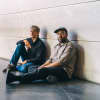From the sound of his new record, it's hard to imagine a guitarist like Steve Gunn calling a place like New York home. The former GHQ member and recent Kurt Vile accompanist's idiosyncratic fretwork—part post-Fahey Americana, part a style all his own—evokes images of tumbleweeds and open roads, and it smacks of the the kind of time-intensive craftsmanship that you can't just pencil in to a crowded schedule. Though it plays out like a collection of tuneful country-rock songs, Gunn's latest full band effort feels like it's making a case for slowing down and focusing on the people and things you miss when you're deep in the work hard/play hard hustle of life in a metropolis. I got together with the soft-spoken underground music scene veteran to talk Time Off, which is out today on Paradise of Bachelors.
What’s the story behind the title of your new album? It might sound like it’s just a vacation-y kind of theme, but that’s totally not what I was intending. This album’s sort of been a long time coming, and I think a lot of stuff I’ve done up until now was just kind of building to what this record is. I guess it’s sort of referencing trying to not give in to the pressures of time. Being a musician, there always seems to be a sort of limit on time—like when should you stop, or when should you quote unquote “get serious with your life,” or something like that. To me, that’s not really what [making music] is about. This record has fallen into a time in my life when these kinds of ideas are in my mind, but I’m trying not to put any pressure on myself in that way.
Have you ever led the kind of life where you felt really constrained, time-wise? That’s part of the answer to the question, too. This album has a lot to do with my environment and living in the city and dealing with living in the city. I definitely deal with a lot of that kind of stress. I work freelance, and trying to make ends meet and support yourself and survive and pay rent and all that stuff—you can get kind of caught up in the cycle of living check to check, even if you have a full-time job. People are just existing in this weird cycle, and I’ve always just tried to exist outside of that and have more of a perspective on what I’m doing. At the same time, I love living in New York. A lot of people think, Oh you live in New York—you must be going out to bars and hanging with these fancy people all the time. There’s 8 million people in the city—it’s not just lower Manhattan and Williamsburg. There’s a whole world out there, and to me that’s my city.
I can’t make out all of the lyrics on the record, but I hear that some of them are about people you run into around your apartment in Boerum Hill. Most of them are characters in my neighborhood. I live in a neighborhood that’s kind of split—there’s people who are sort of new to the city and have a lot of money, mixed in with people who have grown up in this neighborhood and are kind of overlooked and are basically just lingering around. There are certain characters in the neighborhood that no one wants to deal with—they seem a bit crazy, or they don’t get enough respect for what they do. Particularly one person, who does a lot of work in the neighborhood and holds court and has taken on this neighborhood watchdog sort of role. I know for a fact that he does get attention and respect from certain people, but not everyone. For me, observing that kind of situation over the years from a distance has made me want to tell a little bit of a story about it, maybe give that person a little bit of glory in a sense.
Do you see any connection between the album's central theme of unregimented time and playing the guitar, or studying an instrument really seriously? I’ve primarily always considered myself a guitar player, and I’ve been working pretty hard at it for the past 10 years. I’ve spent a lot of time sitting alone in my house, my room, just playing. If I have days off, I’ll definitely try to practice—`or just play, even if it’s sort of a meditation on the day. It’s kind of my way to relax.
Have you ever studied under someone specifically? Not really. I took lessons when I was really young—like 15, 16—and that was bass lessons. And then I started playing guitar when I was 16, and I was just kind of freely strumming. And then when I was about 18, I got interested in playing the blues, so I would pick up those nerdy books and CD-booklet things where you could learn certain styles. And when I discovered [John] Fahey and stuff, there was all these videos by this guy named Stefan Grossman—it’s also really nerdy, but I ordered all these VHS tapes through the mail and they’re all these instructional tapes. John Fahey had two of them, so I bought those two and spent a lot of time with those. And John Renbourn from Pentangle had one. They just play these songs and they break it down and have this split-screen, and I’d press rewind and play a lot. It’s weird because I wasn’t learning full spectrums of things—I was only learning bits and pieces of songs that they would play, but it helped to learn how to use open tunings and all the fingering kind of stuff. I spent a lot of time watching those videos back then.
The tunes that are on the album—are they songs you’d been kicking around for a while before recording full-band versions? Some of them I’ve been playing for a number of years and they’ve sort of changed over that time, and I’ve always wanted to record them in a band context. So we recorded these songs and we’ve been playing them a bit and they’re constantly changing. It’s got a loose sort of swing to it, cause sometimes I’ll not count certain parts properly, [or there’ll be] these improvisational twists and turns to a song, and it kind of expands.The one song called “The Lurker”—I recorded it for this boxed set a few years ago for Three Lobed Recordings. It’s pretty much the same song, but even back then I knew I wanted to do a version like the one that's on the record—a more condensed band version.
On this album do you feel certain influences coming through more than others? All of the other recordings I did with my songs were more like bedroom-style. This was way more of a band situation, where we rehearsed the songs before we went in the studio. While we were there we wanted to go for a certain feel, like records that were done in the ‘70s, records where they’re a little bit folky and not so heavy-handed with the rhythm section, where the rhythm section is just supporting the guitar playing and singing. There’s a record by Bert Jansch called L.A. Turnaround where he basically just has a band backing him up. His playing still comes through but there’s a certain kind of swing to it. There’s this really great Country Joe and the Fish Song—"Rockin' All Around the World"—that’s really cheesy but it’s got this really cool backbeat drum thing to it. We were referencing that. Also a West Coast psych kind of thing, bands like Moby Grape. More like folk-rock records.
I forgot to mention this as far as an influence, but it’s Michael Chapman’s records. He’s a guy who I’m also friends with and have played some shows with and he recorded a bunch of albums in the late '60s and '70s and he’s still around—he’s 70. He had a small band backing him up back then. His first three records are kind of a really big reference point to me and really inspired me to kind of push the songs a little more. His second is called Fully Qualified Survivor and his first record’s called Rainmaker. Basically, he had the guys who basically became The Spiders From Mars, David Bowie’s band—they were kind of like his band before they joined Bowie. So he had this really kick-ass band, and those records were so awesome. They’re really kind of structured in a way that I wanted to present the songs that I had.
What made you want to go a little deeper with your voice this time? I think it was time. I had a lot of experience with playing live and singing live and it took me a long time to get comfortable with it and kind of step out of it and project my voice. So when it was time to do the record and I had the songs done I knew how I wanted it to sound and I didn’t want to sound understated or shy. I get to a certain point with my level of singing where I hit the Eddie Vedder howl, which I always try to avoid, which is when the music is too loud and I’m over-singing—like overdoing it. So there’s this kind of middle ground where I’m not trying to sing too low but I’m also trying to not do this shout-y thing. And not affected either—I’m not really a fan of affected vocals. Sometimes it works really well, but having a British accent or a Mickey Mouse kind of voice or a low, Joy Division voice or something like that….
You have a song about Jack Rose on your album. I was wondering what you would say you've learned from him as a musician. I got to know Jack when I was in college and still learning how to play guitar and learning how to play in that style. I saw Jack play in the band called Pelt back in the mid-’90s at this place called the Astrocade in Philly where a lot of those bands came through. I remember seeing him and sort of meeting him and being a fan of Pelt. And then he moved to Philly and we kind of knew each other—he worked at this coffee shop and this market where I also worked. I worked at the ice cream store. He ended up getting fired. I later found out he got fired because he didn’t give a cop a free cup of coffee. And that’s totally his style. Apparently he just woodshedded and practiced and totally became super, super focused on becoming a solo guitar player.
The first time I saw him play solo properly was at this show that that was in my backyard at the house that I lived in. I later found out that he already had all this blues-playing experience—like he was in bar bands in high school, he already had that kind of ingrained in him. But when he had this time off he just basically worked and worked and worked and then came out and presented shows and it just blew me away. He’s just a kind of no-nonsense guy; he always demanded respect and attention. He could be a bit intimidating but he’s also one of the nicest dudes—and super supportive, if he liked you. If he did like you, it was a real important kind of seal of approval. He was a hero of mine— because of his ability as a player, and also just being a solo acoustic guitar player and being able to hush a crowded room of people at a bar. He was definitely a huge inspiration to me—to work harder, to work hard at your craft and perhaps get respect. He definitely set the bar for all of the post-Fahey players.

